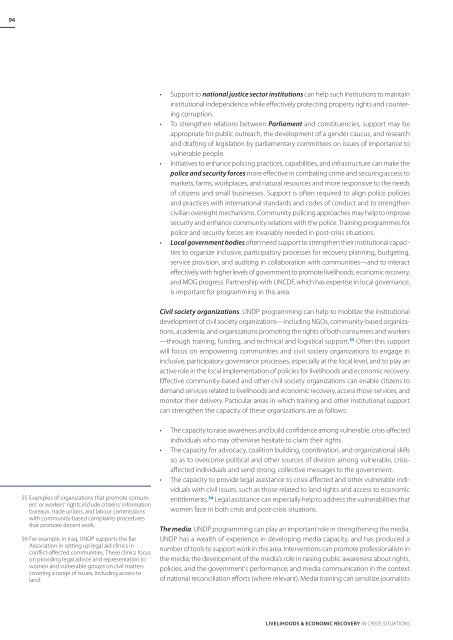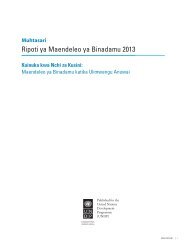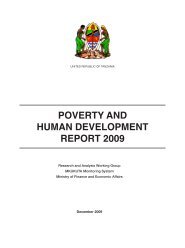Download PDF (4.08 MB) - ReliefWeb
Download PDF (4.08 MB) - ReliefWeb
Download PDF (4.08 MB) - ReliefWeb
Create successful ePaper yourself
Turn your PDF publications into a flip-book with our unique Google optimized e-Paper software.
94<br />
• Support to national justice sector institutions can help such institutions to maintain<br />
institutional independence while effectively protecting property rights and countering<br />
corruption.<br />
• To strengthen relations between Parliament and constituencies, support may be<br />
appropriate for public outreach, the development of a gender caucus, and research<br />
and drafting of legislation by parliamentary committees on issues of importance to<br />
vulnerable people.<br />
• Initiatives to enhance policing practices, capabilities, and infrastructure can make the<br />
police and security forces more effective in combating crime and securing access to<br />
markets, farms, workplaces, and natural resources and more responsive to the needs<br />
of citizens and small businesses. Support is often required to align police policies<br />
and practices with international standards and codes of conduct and to strengthen<br />
civilian oversight mechanisms. Community policing approaches may help to improve<br />
security and enhance community relations with the police. Training programmes for<br />
police and security forces are invariably needed in post-crisis situations.<br />
• Local government bodies often need support to strengthen their institutional capacities<br />
to organize inclusive, participatory processes for recovery planning, budgeting,<br />
service provision, and auditing in collaboration with communities—and to interact<br />
effectively with higher levels of government to promote livelihoods, economic recovery,<br />
and MDG progress. Partnership with UNCDF, which has expertise in local governance,<br />
is important for programming in this area.<br />
Civil society organizations. UNDP programming can help to mobilize the institutional<br />
development of civil society organizations—including NGOs, community-based organizations,<br />
academia, and organizations promoting the rights of both consumers and workers<br />
—through training, funding, and technical and logistical support. 55 Often this support<br />
will focus on empowering communities and civil society organizations to engage in<br />
inclusive, participatory governance processes, especially at the local level, and to play an<br />
active role in the local implementation of policies for livelihoods and economic recovery.<br />
Effective community-based and other civil society organizations can enable citizens to<br />
demand services related to livelihoods and economic recovery, access those services, and<br />
monitor their delivery. Particular areas in which training and other institutional support<br />
can strengthen the capacity of these organizations are as follows:<br />
55 Examples of organizations that promote consumers’<br />
or workers’ rights include citizens’ information<br />
bureaux, trade unions, and labour commissions<br />
with community-based complaints procedures<br />
that promote decent work.<br />
56 For example, in Iraq, UNDP supports the Bar<br />
Association in setting up legal aid clinics in<br />
conflict-affected communities. These clinics focus<br />
on providing legal advice and representation to<br />
women and vulnerable groups on civil matters<br />
covering a range of issues, including access to<br />
land.<br />
• The capacity to raise awareness and build confidence among vulnerable, crisis-affected<br />
individuals who may otherwise hesitate to claim their rights.<br />
• The capacity for advocacy, coalition building, coordination, and organizational skills<br />
so as to overcome political and other sources of division among vulnerable, crisisaffected<br />
individuals and send strong, collective messages to the government.<br />
• The capacity to provide legal assistance to crisis-affected and other vulnerable individuals<br />
with civil issues, such as those related to land rights and access to economic<br />
entitlements. 56 Legal assistance can especially help to address the vulnerabilities that<br />
women face in both crisis and post-crisis situations.<br />
The media. UNDP programming can play an important role in strengthening the media.<br />
UNDP has a wealth of experience in developing media capacity, and has produced a<br />
number of tools to support work in this area. Interventions can promote professionalism in<br />
the media; the development of the media’s role in raising public awareness about rights,<br />
policies, and the government’s performance; and media communication in the context<br />
of national reconciliation efforts (where relevant). Media training can sensitize journalists<br />
Livelihoods & Economic Recovery in Crisis Situations





